- MathNotebook
- MathConcepts
- StudyMath
- Geometry
- Logic
- Bott periodicity
- CategoryTheory
- FieldWithOneElement
- MathDiscovery
- Math Connections
Epistemology
- m a t h 4 w i s d o m - g m a i l
- +370 607 27 665
- My work is in the Public Domain for all to share freely.
- 读物 书 影片 维基百科
Introduction E9F5FC
Questions FFFFC0
Software
Contributed to the Philosophy of Religion section of the World Congress of Philosophy on August 19, 2018 in Beijing, China.
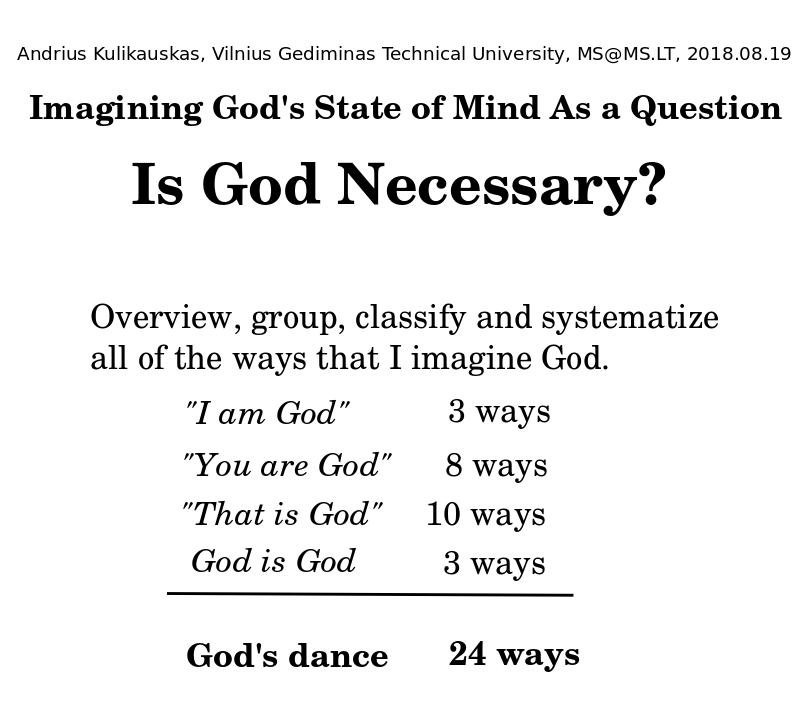
Imagining God's State of Mind as a Question
Is God Necessary?
I present a conceptual framework, God's Dance, which expresses what unfolds when I imagine God asking himself: Is God necessary?
My method is to survey and systematize the ways that I sincerely imagine God. I note different pronouns by which I have God refer to God.
- In 3 ways, I imagine what God experiences in the first person, "I am God".
- In 8 ways, I imagine God addressing God as the second person, "You are God".
- In 10 ways, I imagine God observing God as the third person, "That is God".
- In 3 ways, I imagine preconditions for God and for me as well, by which God lives through me: God is God.
Taken together, these 24 ways describe God's dance, which I present.
Such a framework outlines what perhaps any human imagination inherently supposes upon imagining God's vantage point. I wish to know everything and apply that knowledge usefully, and so God's vantage point is very relevant, whether or not God himself is real. Indeed, such a vantage point is fundamental if we are to have absolute truth or simply a big picture of life.
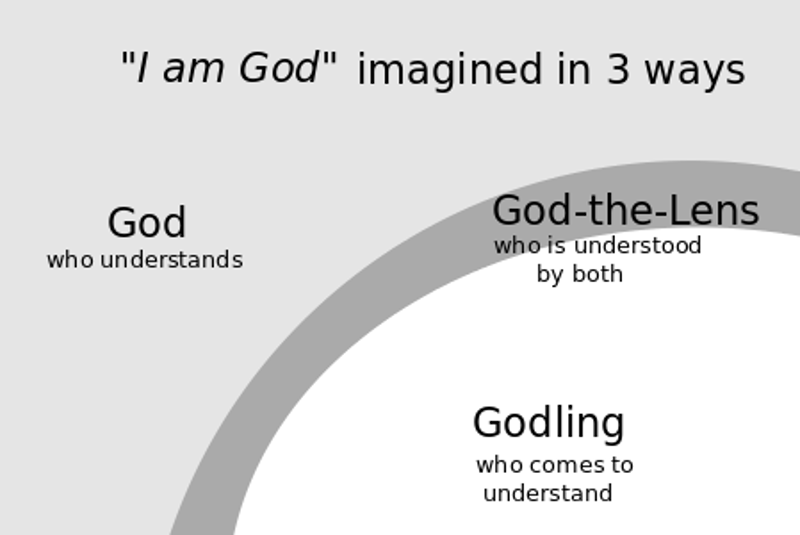
I am God
Let us imagine God all alone, prior to all things, including logic, time, world, thought, being, meaning and love.
What could possibly motivate God?
I imagine only one issue. God asks himself, Is God necessary? Would God be even if God was not? And so God proceeds as in a proof by contradiction. If God exists, then God exists. Such is the spiritual world. But suppose God did not exist. Even so, ultimately, God should exist. This accords with the physical world.
God thus makes way for the least favorable situation for his existence, which we can think of as our own lives. Surely God must arise, as I believe occurred with Jesus, although it could and should with any of us. For each of us is a Godling, a drop of God, a shard of God, a child of God. And so there is God who understands but also God who comes to understand that he is God. How do they know that they are the same God? They understand the same God! namely, God-the-lens by which the Godling is equal to the original God. For the Godling's incredible naivety insists that God be good, and indeed, makes God so.
This says less about God and more about the ways our imagination approaches God. It makes sense of Christianity's Holy Trinity without relying on faith or requiring any mystery. God asserts "I am God", Godling asserts "You are God", and God-the-Lens asserts: "That is God".
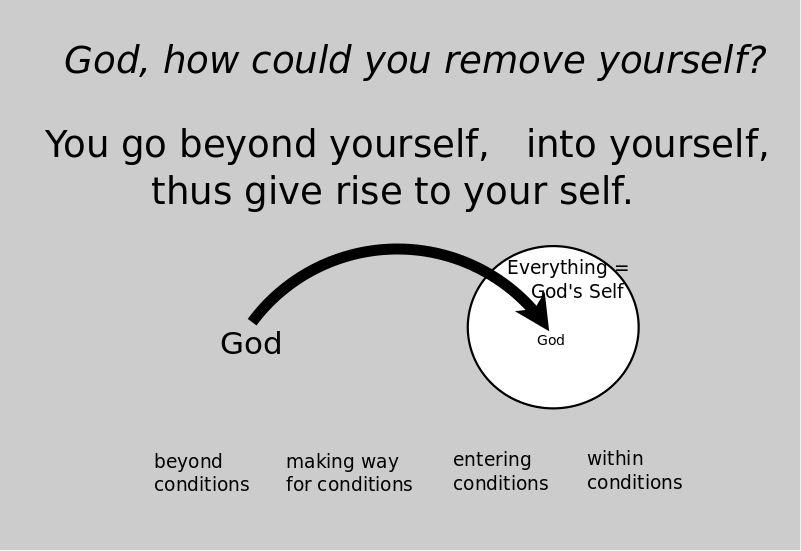
You are God
We have described three perspectives by which God considers whether God is necessary. But this is how it appears for God who understands. How does it look to the Godling who comes to understand, for whom God is "You"? The Godling does not experience God's going beyond himself but rather distinguishes its four stages. Furthermore, the Godling may welcome God within this world or discover God beyond it. The various combinations yield eight ways of imagining God.
For God to remove himself, he must go beyond himself. But he is yet to have a self, and so this self arises as he goes beyond himself. And he has nowhere to go except into himself. Thus he goes beyond himself, into himself and thereby gives rise to himself. God thus finds himself within a system, within conditions. And God within conditions is goodness.
With all of this in mind, I imagine God's going beyond himself in terms of four distinct states: God beyond conditions, God making way for conditions, God entering conditions, and God within conditions.
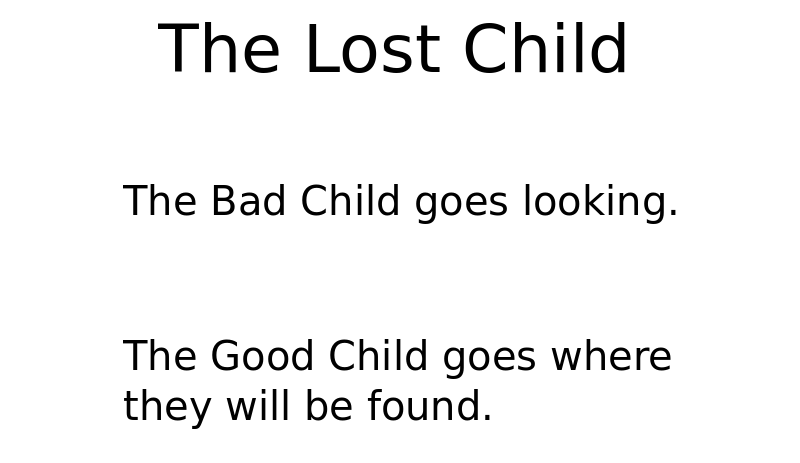
Imagine that God is a parent and the Godling is a lost child. Foolish children look for their parents, which makes things worse. Wise children realize, "I am the child; they are the parent; they should be looking for me; I will go where they will most easily find me." Wise children coordinate with their parents without any communication.
In the Gospels, I discern a conflict between the Son's and the Father's point of view, where they favor the good child and the bad child, respectively. The Son's vision is given by his Sermon on the Mount, whereby the moral behavior of the good children establishes a "kingdom of heaven", in which what we believe is what happens, God is welcome on this earth, and everybody is drawn in. The Father's vision is rather to let us, sinners, hate the Son for being good, make an example of him, realize the evil we have done, repent and be saved. Thus "God so loved the world that he gave his only begotten Son...", whereas at the Last Supper, the Son tells the Father, "I don't pray for the world, I pray for my own." And yet, the Son defers, "Not my will, but yours."
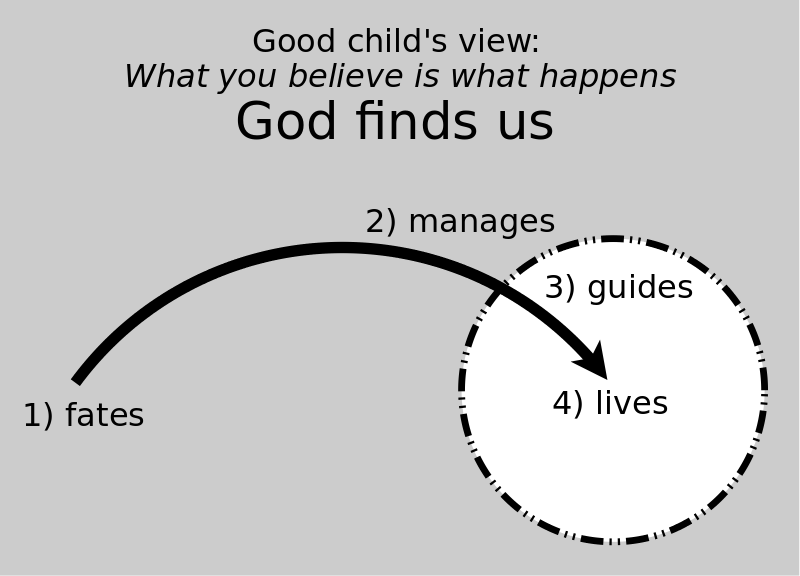
We thus have two narratives. The "good child" wonders, "Am I God?", and comes to realize, "Yes, I am God, in that God lives through me, in that I am good." As a good child, there are four ways that I welcome God who is beyond goodness:
- 1) God who fates and knows all things;
- 2) who manages developments, rewarding us and punishing us;
- 3) who inspires us to realize that God does not have to be good, life does not have to be fair, but we ourselves can be good.
- 4) God who lives through our freedom as we cultivate a shared culture, the Kingdom of heaven, where what we ourselves believe is what happens.
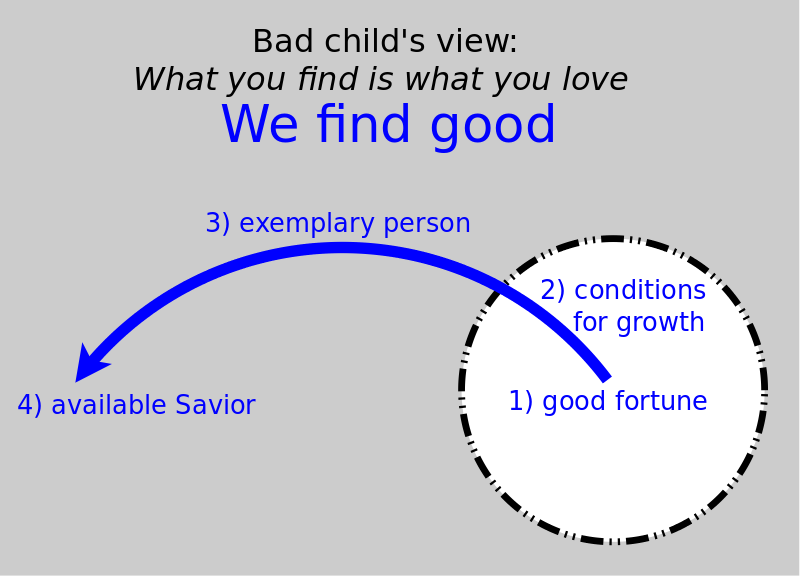
The "bad child" wonders, "Am I good?", and comes to realize, "No, I am not good, for I need God, who is greater than me." As the bad child, I equate God with goodness in four ways:
- 1) My good fortune, instances of undeserved grace, which suggest that good has a source.
- 2) The love for me which enables me to grow by letting go of my old self and taking up a new self.
- 3) The standard of an all-around perfect person who I may always choose to embrace.
- 4) The God whose wisdom and providence is incomparably greater than mine, and who is good enough to overcome any evil.
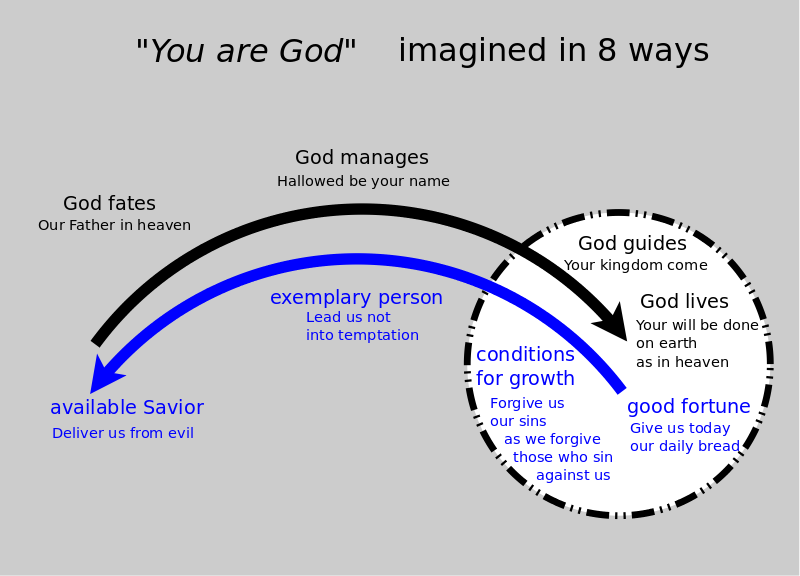
These two narratives define an eightfold structure by which we as Godlings imagine, "You are God". I think it is fundamental to the prayer "Our Father" which Jesus taught for engaging God. Other eightfold structures which I think leverage this framework are The Beatitudes, St.Peter's eight virtues from faith to love (2 Pt 1:5-7), Buddha's eightfold way, and even the major chords of the musical octave.
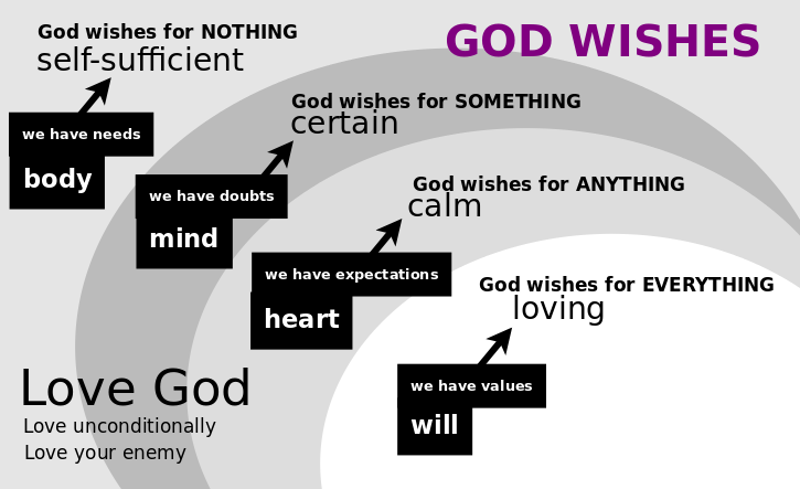
That is God
Consider now how this looks to God-the-lens for whom "That is God". God's going beyond himself yields 4 different stages where God and Godling may coincide. Yet there are also 6 different pairs of stages by which they may be separated. I relate these to the Ten Commandments, four of which are positive, and six of which are negative.
A headstrong God goes beyond himself by wishing conditions upon himself: Nothing, Something, Anything and Everything. Whereas we, as Godlings, already find ourselves in conditions, and thus we do not wish them.
- God wishes for nothing, is self-sufficient, the primordial God who is prior to all. Whereas we are not self-sufficient but have bodies with needs.
- God wishes for something, is certain, the divine inquiry. Whereas we are not certain but have minds with doubts.
- God wishes for anything, is calm, and lurks in ambiguity, both within our world and beyond it. Whereas we are not calm but have hearts with expectations.
- God wishes for everything, is loving. God is the good heart in us, which we make way for by showing good will. Whereas we are not loving but have wills with values.
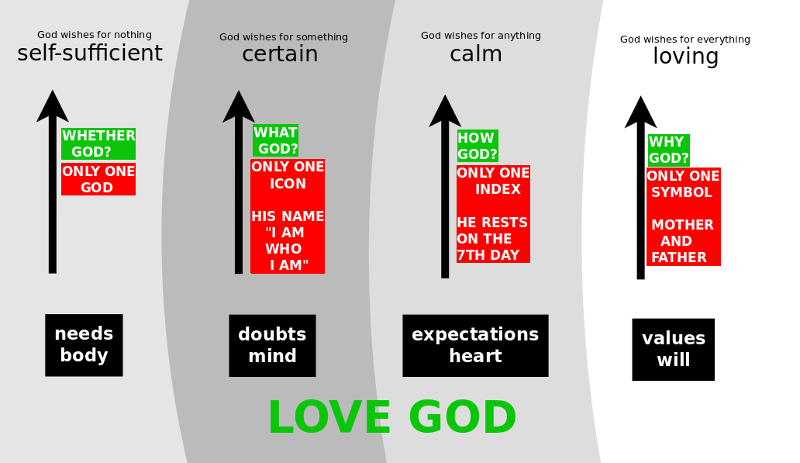
Charles Peirce's signified (whether) and three kinds of sign - icon, index, symbol (what, how, why) - inspire me to relate the above with four positive commandments for being one with God by embracing his wishes:
- There is one God, who is self-sufficient.
- God's icon is his name of certainty: "I am who I am".
- God's index is his activity of peace, our day of rest.
- God's symbol is our parents who love us more than we love ourselves.
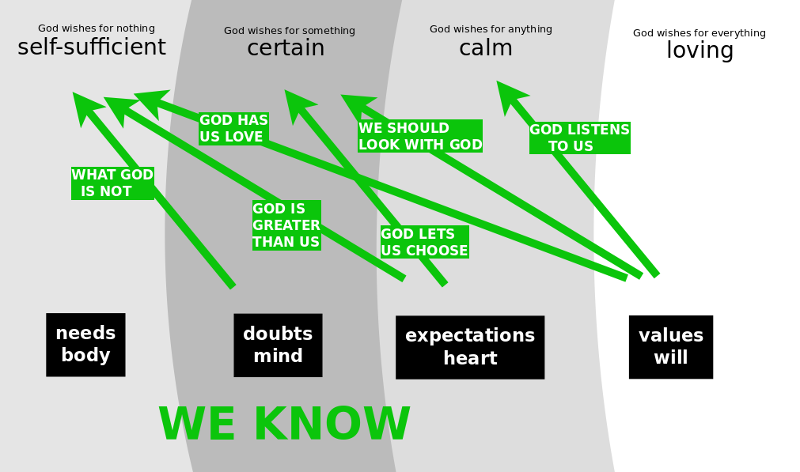
We thus embrace a manifestly unconditional God at some point of his going beyond himself in conditions. In practice, this means unconditional love, as when we love our enemy. Now, we in conditions may be disconnected from God. Immersed in life, we may not avail of God's perspective, his wishes from beyond conditions. Still, we variously know of a potential, imaginary, unconditional God from what we know about our own conditions. This negative knowledge informs 6 negative commandments, what we should not do. We must respect the divinity which we know is inherent and potential in our own conditions. We thus must likewise love our selves, our friends, our neighbors.
- God is self-sufficient, whereas we have minds with doubts. Our minds know what God is not. God is beyond all we can know, within the very depths of people. We cannot kill God and we should not kill a person.
- God is self-sufficient, whereas we have hearts with expectations. Our hearts know that God is greater than us. We cannot steal from God, and we should not steal from people.
- God is certain, whereas we have hearts with expectations. Our hearts know that God lets us choose. We must respect people's absolute decisions. We must not adulter.
- God is calm, whereas we have wills with values. Our wills know that God listens to us. We cannot fool God, and we should not lie to ourselves nor others.
- God is certain, whereas we have wills with values. Our wills know that we should look with God rather than at God. We should look with God beyond anyone's things. We should not covet things.
- God is self-sufficient, whereas we have wills with values. Our wills know that God mandates us to love people devotedly. We should let all love those who are given for them to love. We should not covet people.
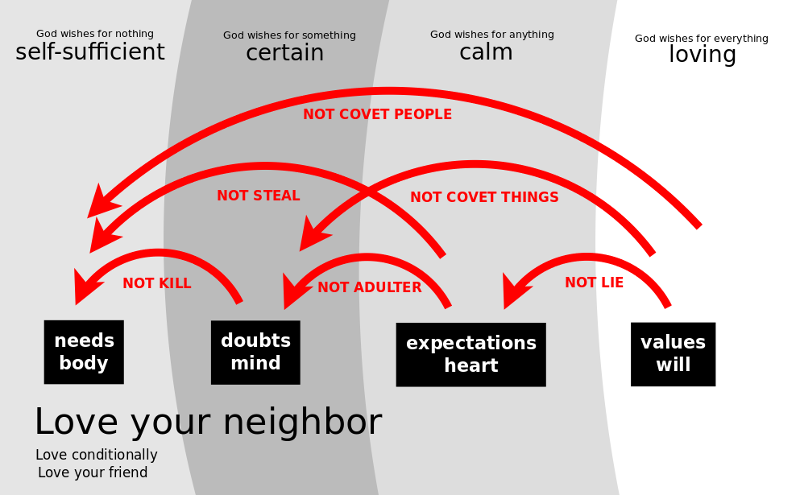
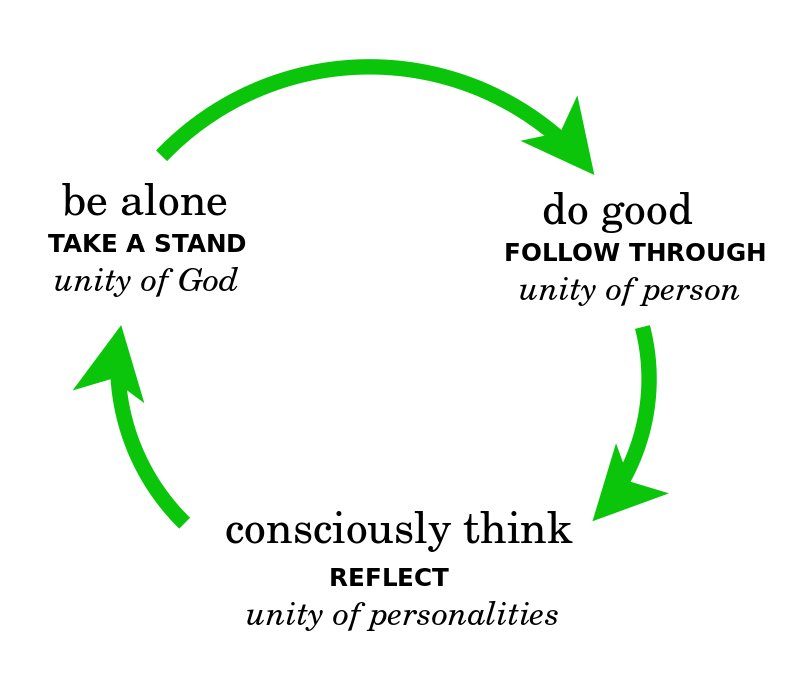
Uniting God
How are these all the same God?
There are three more ways that I imagine God by which I experience the preconditions for God.
- When I am absolutely alone, heartbroken, then I may empathize with God who is likewise all alone, just like me.
- I may choose to do what any good person would do. I thereby suspend and regain all of my personal talents.
- As a group, we may alternate in stepping-in (sharing our personal view) and stepping-out (observing the group dynamics) so that a holy spirit flutters amongst us. This supports the consciousness of each and every one by which we each consider whether to step-in or step-out.
Each of these preconditions for God is also a condition for me, and thus each of them unites God's being and nonbeing. In life, when we take a stand, follow through, and reflect, then we live and unite these three unities. I take a stand as if I was all alone; I follow through as a person-in-general; and I reflect with a consciousness that steps in and out of a community.
This three-cycle of preconditions is the same for God as for me or any such Godling. I am a human who does not fully appreciate that I am God. As such, I manifest that God is not necessary!
However, this learning cycle of taking a stand, following through, and reflecting, allows me to grow continuously from what I am doing towards what I should be doing, which is the scope of morality. I take a stand, but do I follow through? I follow through, but do I reflect? I reflect, but do I take a stand? These questions reflect my independence of God but they also expose my vulnerability to all that is beyond the learning cycle and may prejudice it. If I leverage the fruitfulness of my learning cycle, if I am able to live ever closer to the edge, ever more alive, sensitive and responsive, then my life is bearing witness to God who watches over me. In my life, God grows from a cold, self-sufficient God to a warm, loving God, and the fruitfulness of such friendships is what manifests God's necessity, his reality, his existence there where he was not.
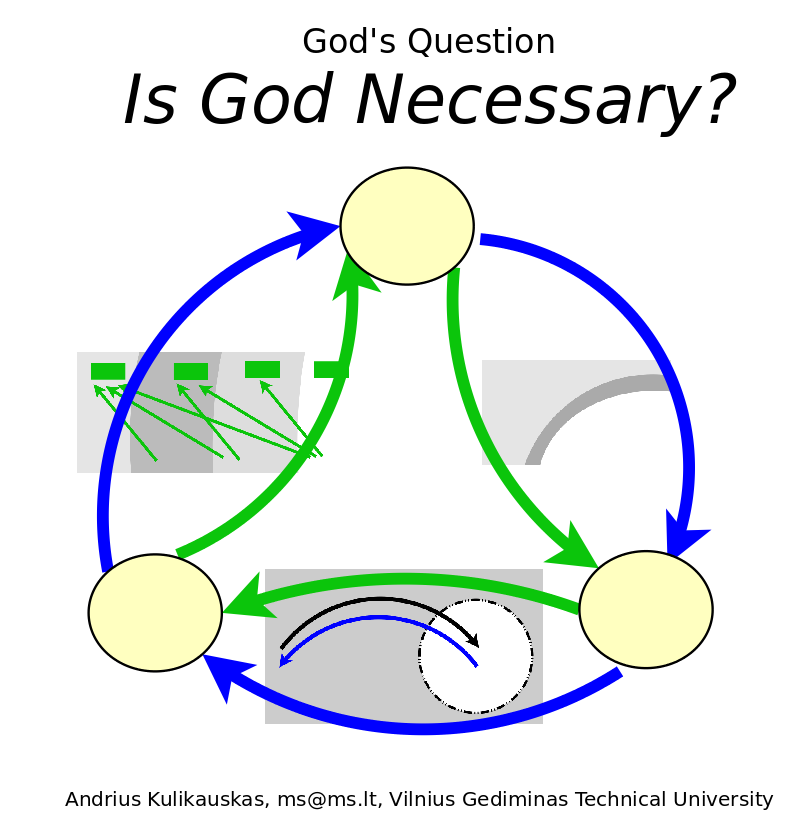
I have sketched God's dance by structuring the 24 ways that I imagine God. Indeed, if God wants me to know everything, in what form might that knowledge be available to me? It seems reasonable that it match the very limits of my imagination itself. And so, pragmatically, to the extent that there is a God, one who is not cruel, then this investigation yields true knowledge. But regardless of the actual nature of God, it documents and models the kind of God that, by my nature, is inherent in my imagination.
Acknowledgments
Thank you to Thomas Gajdosik for many hours of supportive conversation.
